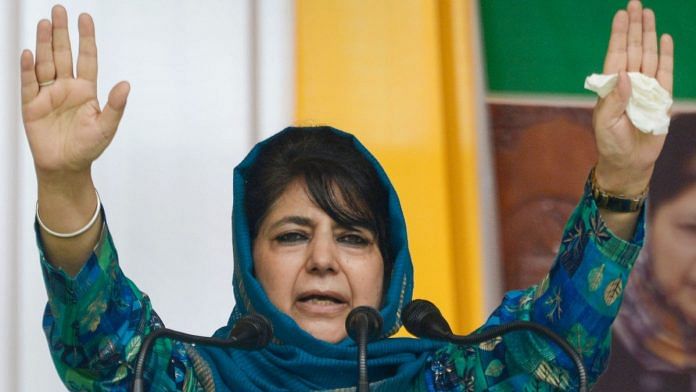New Delhi: With the release of National Conference chief and Srinagar MP Farooq Abdullah from detention, the Narendra Modi government has launched the second phase of its Kashmir policy, after having scrapping Article 370 in August 2019. However, another former chief minister and Peoples Democratic Party (PDP) leader Mehbooba Mufti may not be released immediately, government sources have told ThePrint.
The government has adopted a three-pronged strategy for Jammu and Kashmir, with the key objective being to kick off the political process in the Kashmir Valley. The government feels that the security situation has stabilised there, and it is time to engage with the politicians, who are ready to accept the fact that the earlier version of Article 370 is now history, and it is time to look forward.
The Modi government’s strategy focusses on engaging with political parties and politicians that have credible presence in the Valley, giving a thrust to economic development and welfare programmes, while continuing with its ‘iron hand’ policy against terrorists.
Government sources say the Centre is expecting that after the Jammu & Kashmir Apni Party headed by Altaf Bukhari, some more political parties will set up in the Valley in the days to come, and that it would be open to engaging with them.
Also read: What Farooq Abdullah’s release means for mainstream politics in Kashmir
Cautious approach
The government is cautious in moving on to the second phase of its Kashmir policy, especially when it comes to dealing with the ‘old players’ in the state, the NC and the PDP, who have thrived by changing their stands and raking up a hardline whenever it suited their political ends.
The reason behind the adoption of this policy is that both the NC and the PDP are perceived to be largely Valley-based parties, having a limited influence in select districts. The NC is perceived to have a relatively greater sphere of influence than the PDP. The PDP is also perceived to have adopted a more hardline approach, and to be less inclined towards being part of the mainstream.
The Modi government feels that one of the key elements required for a permanent political solution in the Valley is to free its politics from the clutches of certain families that have been driving it for their own vested interests in the name of the common people.
The lukewarm response of people to the detention of these ‘old guard’ leaders over the last six months has given the government the confidence that the Abdullahs and Muftis don’t hold sway over the masses of Kashmir.
“Unlike the past, there have been no stone-pelting incidents or major protests, even though some major encounters against terrorists have taken place over the last six months,” said a senior government official who did not wish to be named.
“It shows that the political ecosystem which nurtured these kinds of subversive activities doesn’t exist anymore in the Valley, paving the way for the beginning of the democratic process,” the official said.
“In light of these developments, the emphasis is now to help build a new political ecosystem in the Valley, comprising politicians and political parties which represent the aspirations of the people on the ground, beyond the NC and the PDP.”
Also read: I’m free, I’m free… but freedom is not complete, says Farooq Abdullah after PSA is revoked
Apni Party’s meetings with Modi & Shah
Union Home Minister Amit Shah’s meeting with a delegation from the newly formed Jammu & Kashmir Apni Party, headed by former PDP leader Altaf Bukhari, in New Delhi on 15 March is an outcome of the government’s approach mentioned above. Bukhari also met Prime Minister Narendra Modi and praised him for his concern for Jammu & Kashmir.
Shah discussed nearly 40 issues raised by the 24-member delegation, and assured the leaders that the government would take steps for the overall development of Jammu & Kashmir. He also expressed confidence that visible changes would be seen on the ground in the next three to four months.
Shah also allayed one of the biggest apprehensions expressed by certain Kashmiri politicians, regarding the possible change in demographic profile of the Valley after the scrapping of Article 370, which did not allow Indians from other parts of the country to buy property or become permanent residents there. Shah categorically told the delegation that the government had no intention to change the demographic profile of the region.
Significantly, he also said that his government would work with all sections of the society to realise the hopes of statehood for Jammu & Kashmir at earliest.
Shah’s engagement was a clear message that the Modi government would move beyond the NC and PDP and start a political process involving new players.
The writer is CEO of Indraprastha Vishwa Samvad Kendra, an RSS affiliate, and author of two books on the RSS.
Also read: Former PDP, NC leaders launch ‘Apni Party’ in Jammu and Kashmir, BJP welcomes move




The BJP can launch as many APNI Partys as it wants. The point is, to how many people it will provide Z+ security?